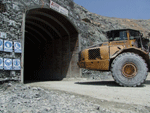Ghana: Collection of increased tax for mining companies is being delayed
Published on Mon, 2012-02-20 10:05
Three months after the announcement of an increase in corporate tax for mining companies from 25 to 35 percent in Ghana, the raise is yet to be implemented. The tax may not be collected until 2013, according to TV3 television channel. “The attitude of government gives reasons to believe that it will yield to pressures from the industry,” wrote Alhassan Atta-Quayson, expert of Third World Network-Africa (TWN-A). “The Chamber of Mines reported that the new taxes would hurt mining companies and AngloGold Ashanti, followed up with a threat to stop production of some mines due to increased overhead cost resulting from the new taxes,” added Atta-Quayson. TWN-A warned that charging the tax next year will mean bleeding the economy. Finance minister, Kwabena Duffuor, announced the increment in corporate taxes from 25 percent to 35 in addition to a wind fall tax of 10 percent. A legislative instrument expected to give the revenue authority a breakdown for collection is yet to be put before parliament, this is likely to push the collection of the tax, reported TV3. TWN-A says there is no time to waste. Negotiations are on going between government and the mining companies and it is likely to delay the tax. A corporate tax of 35 percent was charged until 2006 when it was reviewed downwards to 25 percent. Ghana's 2012 national budget statement and economic policy proposes to reintroduce the following fiscal initiatives into the mining sector: increase corporate tax rate from 25% to 35%; install a windfall tax of 10%; and implement a uniform regime for capital allowance of 20% for five years, explained Atta-Quayson in a column published by several Ghanaian media. “Civil society organizations such as the National Coalition on Mining and the Ghana Mineworkers Union commended the government for the initiatives and called for additional measures to improve the contribution of the sector to the economy of Ghana. […] However, as a country, we have an experience in making laws that are never implemented and the mining sector is a typical case in point where laws made to regulate the sector are not applied,” the expert wrote. “The successful implementation of the taxes and reforms depends on a number of factors,” among them the “political will on the part of the executive to roll back pressures and threats from mining companies,” he said. “The executive, as per Ghana's governance structure, has a direct control over the ministries responsible for developing the regulations and collection of taxes. The fact that regulations have not been tabled in parliament is signal to inadequate commitment on the part of the executive to push through the new taxes at times they are needed most,” added the expert. “The mining industry is already putting pressure to roll back these new taxes. The Chamber of Mines reported that the new taxes would hurt mining companies and AngloGold Ashanti followed up with a threat to stop production of some mines due to increased overhead cost resulting from the new taxes. The attitude of government gives reasons to believe that it will yield to such pressures from the industry. In 2010, similar proposals were made but were not implemented,” Atta-Quayson remembered. Sources |







